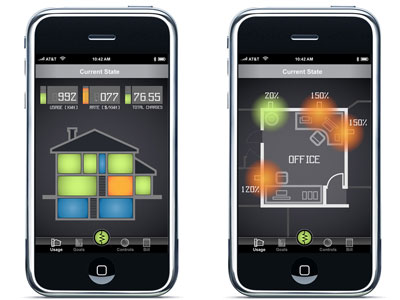Can the Creators of the iPhone Make Home Energy Management Sexy?
Nest Labs, is a super stealth-mode company that is creating a home energy management system – basically a digital thermostat that can be managed remotely in order to save energy. It’s a lot like its competitors Tendril, EcoFactor, and OPower, but with one very important difference: its founders helped invent the iPhone’s distinctive interface.

If anyone can rescue home energy management from energy geeks and utility companies by making it as sexy, appealing and ubiquitous as Steve Jobs’s little dream machine, it’s these guys.
And, as gumshoe Michael Kanellos, editor of GreentechMedia, discovered, it appears that Nest Labs already has some deep-pocketed backers. Kleiner, Perkins could be one of them. It would make sense: Mike Matas, who helped design the iPhone’s interface and whose LinkedIn profile says he’s currently a designer at Nest Labs, is friends with Al Gore, a partner at Kleiner, Perkins. Kanellos’s anonymous source says that Nest Labs already has a “very high” valuation after its initial round of fundraising.
Other folks involved in Nest Labs appear to include Matt Rogers, an iPhone software manager at Apple, and Pat Cocoran, formerly of Salesforce.com.
So, what’s the iPhonification of home energy management going to look like? Hopefully something more exciting than the way Nest Labs describes itself in its trademark filing:
[C]limate control system consisting of a digital thermostat that automatically sets climate conditions based on prior and historical patterns of climate settings selected by users; climate control system consisting of a digital thermostat that can be controlled wirelessly from a remote location; software application for use on computers and hand-held devices to control climate and energy usage in homes and businesses from a remote location.
Keep Reading
Most Popular
Large language models can do jaw-dropping things. But nobody knows exactly why.
And that's a problem. Figuring it out is one of the biggest scientific puzzles of our time and a crucial step towards controlling more powerful future models.
The problem with plug-in hybrids? Their drivers.
Plug-in hybrids are often sold as a transition to EVs, but new data from Europe shows we’re still underestimating the emissions they produce.
Google DeepMind’s new generative model makes Super Mario–like games from scratch
Genie learns how to control games by watching hours and hours of video. It could help train next-gen robots too.
How scientists traced a mysterious covid case back to six toilets
When wastewater surveillance turns into a hunt for a single infected individual, the ethics get tricky.
Stay connected
Get the latest updates from
MIT Technology Review
Discover special offers, top stories, upcoming events, and more.